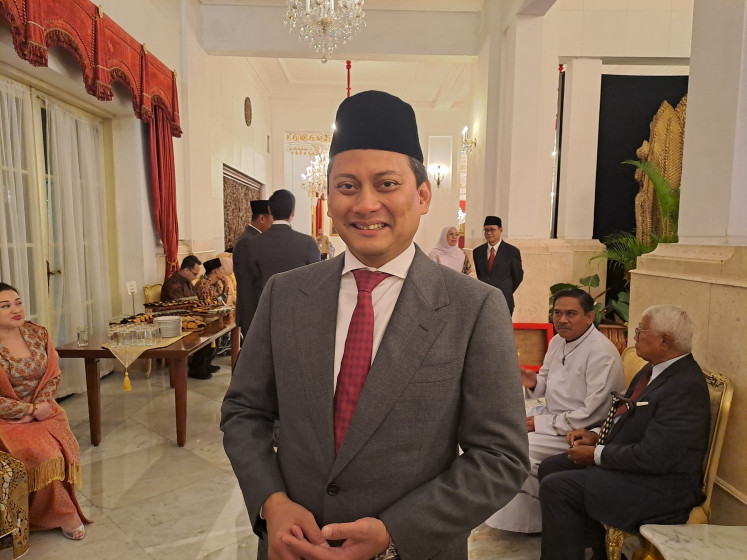Popular Reads
Top Results
Can't find what you're looking for?
View all search resultsPopular Reads
Top Results
Can't find what you're looking for?
View all search resultsASEAN can help address the Korean crisis
While United States President Donald Trump and North Korean leader Kim Jong-un indulged in a battle of incendiary rhetoric recently, ASEAN was at a crossroads
Change text size
Gift Premium Articles
to Anyone
W
hile United States President Donald Trump and North Korean leader Kim Jong-un indulged in a battle of incendiary rhetoric recently, ASEAN was at a crossroads. The regional grouping faced the choice between either buckling under the US pressure to further isolate North Korea and oust the country from the ASEAN Regional Forum (ARF) or rebuffing Washington’s request by standing firmly in the promotion of dialogue and diplomacy to de-escalate these simmering tensions.
Sensibly and correctly, ASEAN chose the latter.
Discussions on settling the Korean Peninsula conflict during the ASEAN Ministers Meeting (AMM), the East Asia Summit and the ARF were much anticipated. ASEAN issued a stand-alone statement conveying its grave concern over North Korea’s continued launch of ballistic missiles and nuclear tests and called for complete denuclearization.
Apart from the UN, North Korea’s participation in global security forums is limited to the ARF. With newly imposed and potentially crippling UN sanctions, the country’s heightened global isolation amplifies tensions in an already bleak conflict.
With these considerations in mind, rather than suspending North Korea’s participation in the ARF, ASEAN instead appealed to all parties involved for self-restraint and conveyed its readiness to play a constructive role in contributing to peace and security on the Korean Peninsula.
Given its firm stance during the series of AMM meetings, ASEAN has stepped away from US-led efforts to isolate North Korea. The question remains, however, whether ASEAN can foster diplomacy and dialogue to reach a resolving outcome. There are several possible roles the association could play in this situation.
First, by choosing not to fully alienate North Korea, ASEAN provides a crucial window of dialogue within the ARF to build constructive engagement. Aside from the US and North Korea, this 27-member forum also includes the additional four members of the now dormant six-party talks, namely South Korea, Japan, Russia and China.
Prior to the six-party talks’ disintegration in 2009, the framework allowed interests of the surrounding states to be taken into account. Via the ARF, ASEAN can enact the role of facilitator to reignite dialogue involving the parties, ensuring channels for dialogue remain open.
Second, ASEAN can actively work with the Moon Jae-in administration as South Korea aims to play a “balancer role” between the US and Chinese interests in the region. The new administration is committed to maintaining dialogue with North Korea and envisions a peaceful, nuclear weapons-free and prosperous peninsula. It is in ASEAN’s interest to support South Korea in achieving this vision for stability, as armed conflict in the North may see instability ripple across Southeast Asia.
Third, ASEAN will need to persuade Japan and South Korea to halt their pursuit of nuclear weapon artillery as a means to deter North Korea from its nuclear program. Both countries have legitimate fears based on North Korea’s rhetoric and military exercises, but pushing forth with their own nuclear program as a means of deterrence will only diminish trust among the neighbors. At the same time, ASEAN must work with China as it tries to defuse tensions along its border.
Following the dramatic exchange of threats between the US and North Korea in recent weeks, President Xi Jinping has called on both leaders to scale down inflammatory discourse and stressed the importance of diplomacy. Both points are equally important to ASEAN, as it aims to facilitate productive engagement across parties.
In conclusion, ASEAN is correct to act cautiously in its approach to de-escalate tensions in the Korean Peninsula by remaining non-partisan, neither leaning toward the US nor North Korea, nor siding for isolation. ASEAN has maintained its unity by not allowing external parties to drive its approach toward the Korean Peninsula.
These days, as policies are often prescribed by the idiosyncrasies of a leader rather than sound and rational mechanisms, the aforementioned decisions made by ASEAN prioritize preventive diplomacy and should be used as momentum to increase and promote diplomatic solutions.
Amid this complex and delicate situation, ASEAN is positioned uniquely as a facilitator rather than bystander. Grasping that opportunity will require ASEAN to step up and rise to the challenge, as letting it pass by could lead to catastrophic damage to the region and the world. As dangerous rhetoric continues to seethe and more countries are pressured to isolate North Korea, ASEAN could be their only hope for global dialogue.
_____________________________
The writers work for the Indonesian Foreign Ministry. The views expressed are their own.










